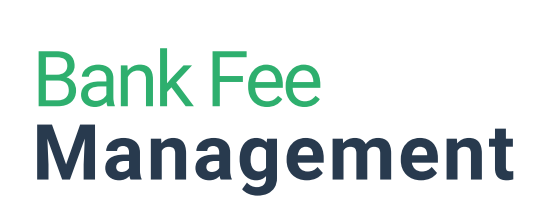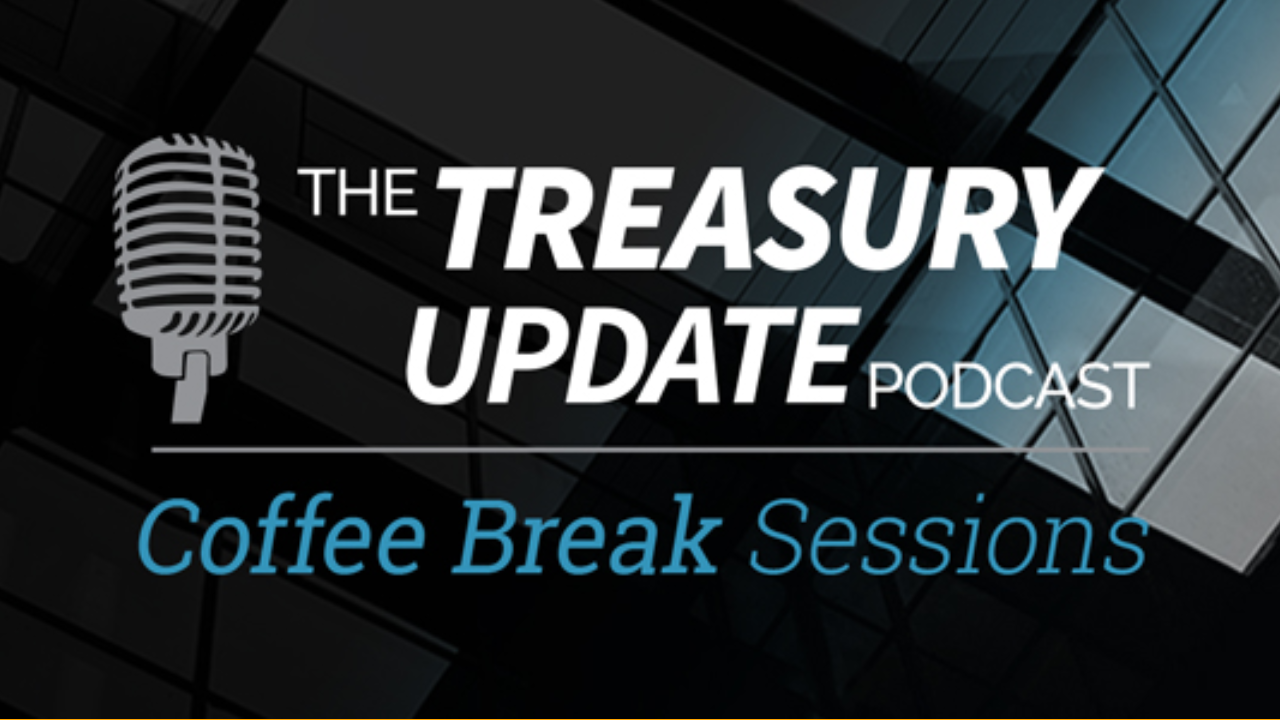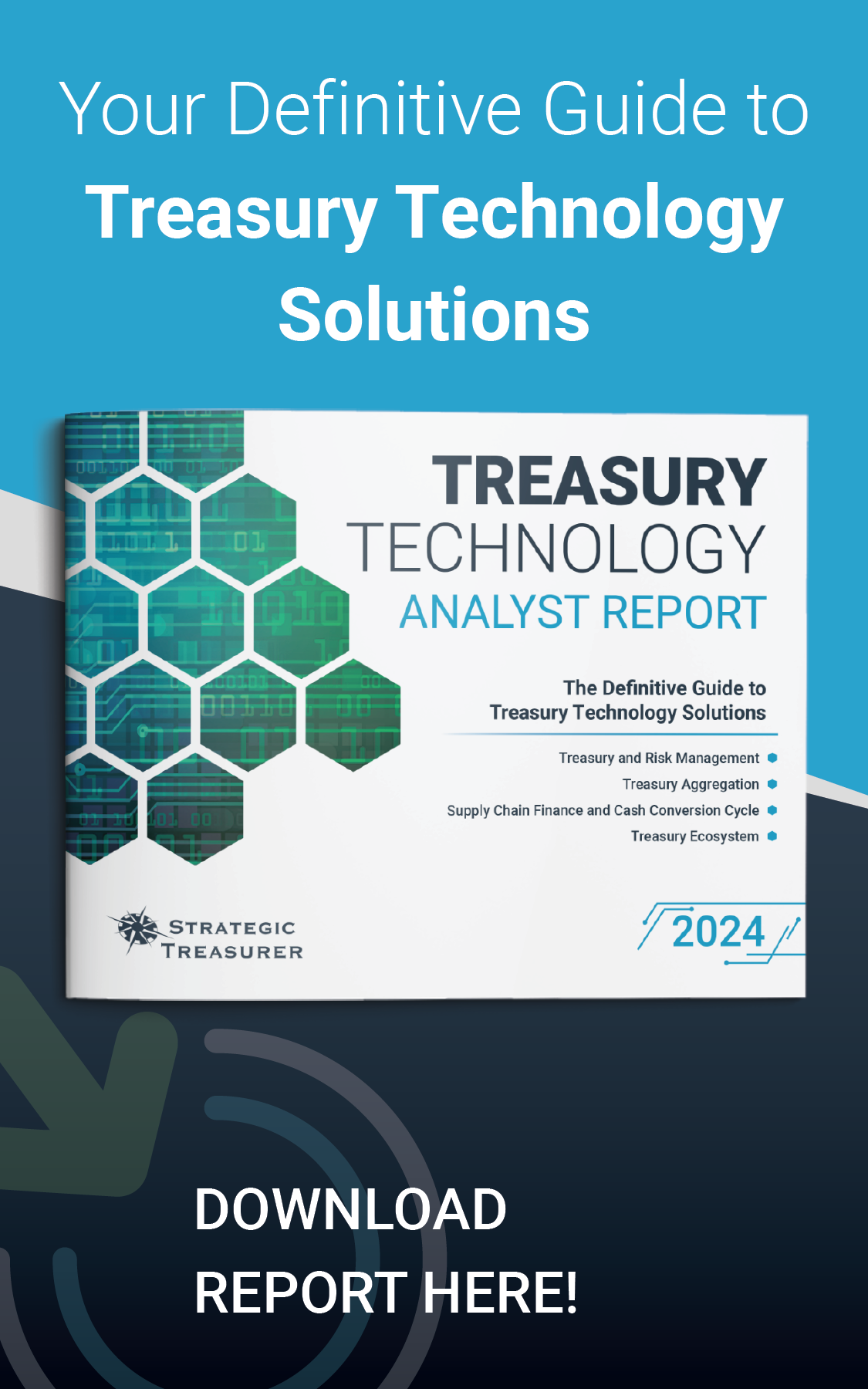
Session 25
Coffee Break Session:
What Is Global Expansion?
What is global expansion? Coffee Break Session Host Alexa Cook catches up with Stephanie Villatoro, Senior Consultant at Strategic Treasurer, to discuss what global expansion is and the implications it has for treasury. They discuss some considerations for treasury to keep in mind when expanding globally and cover relevant differences between countries. Listen in and learn a little bit about global expansion.
Host:
Alexa Cook, Strategic Treasurer


Speaker:
Stephanie Villatoro, Strategic Treasurer


Episode Transcription - CBS Episode 25: What is Global Expansion?
ALEXA COOK:
Hey guys, welcome to the Treasury Update Podcast, coffee break session. The show where we cover foundational treasury topics and questions in about the same amount of time it takes you to drink your coffee. This is your host Alexa, and today I’m joined again with Stephanie Villatoro senior consultant at Strategic Treasurer. Welcome back, Stephanie.
Stephanie Villatoro:
Thank you, Alexa.
ALEXA COOK:
So today we’re going to be kicking off a new mini series for our coffee break sessions, which is going to focus a little bit more on global treasury topics. So if you’re a listener, I know in the past, you’ve probably heard us discuss some bank account management topics, which did touch on global considerations. And those kind of acted as a sneak peek of what we’re going to touch on in this new series. And today to kick off this series, we’re going to be talking about some treasury considerations you might have when expanding a business globally. So Stephanie, at a high level, what might we want to look out for when we’re entering a new country from the treasury perspective?
Stephanie Villatoro:
This is going to apply whether or not you are starting something in a country and it’s a startup, or if you have acquired a company. So some things might vary because if you’re acquiring, they’re already set up in the country, but you still have to look at the different aspects of that. And one of the first things you have to look at is just local regulations that applies from a treasury perspective to opening your accounts, foreign exchange, looking at different regulations or compliance that you have to attend to. Whether it’s US based compliance, or if its compliance it’s local within the country.
ALEXA COOK:
That’s a good point. So you just mentioned some local regulations. Let’s talk about that a bit more. What are some examples of these?
Stephanie Villatoro:
I think one of the biggest ones that people would know about right now is GDPR, which is the Global Data Privacy Regulation in the UK. So whether you sit in the United Kingdom or sit abroad, you have to comply with their privacy regulation. So that’s one of the biggest one from a data privacy standpoint, and we’re seeing other countries or jurisdictions around the world piggybacking off what the UK has done there. The other is US regulations that impact global operations. Everyone’s familiar with FBAR, Foreign Bank Account Reporting, as well as FATCA, that you have to comply with as well with US citizens, residents or aliens from the US sitting in another country, or here with signing authority overseas. So those are some different things from a regulation standpoint that you need to be aware of. And those are just a few examples, but there may be others within individual countries around the world.
ALEXA COOK:
That’s a good point. I know that when I lived overseas, I did have to comply to FATCA just because I was a US citizen. I had a German bank account at the time, and I think per the IRS, you just have to prove that your balance in that foreign country is not high enough and you’re not making any money in it, there’s nothing to be taxed there. I think I had €500 in it at the highest point, but yeah, those are real things for consideration. And that kind of leads into the next piece really, which is bank accounts. What are some examples of, I guess, considerations around bank accounts in these foreign countries?
Stephanie Villatoro:
Some considerations around bank accounts, they may have different practices locally for opening an account or acting upon an account or changing a signatory, or even having US signers on an account there. So those account opening processes are different from country to country. The KYC, so they know you’re customer that they have to comply with. It could be governmental requirements for opening accounts. So there’s various things. So I’ll give you some examples, opening and closing an accounts in some countries require you to be in person.
Stephanie Villatoro:
I actually experienced this and had to send someone on a boat over from Hong Kong to Macau to open an account for us before we went live on our conversion, but they needed to have the documents signed in person by someone from the company. Another is, closing an account in Colombia, we’re dealing with that today with trying to have someone walk in during COVID to close an account that’s no longer used, so there’s some challenges there as well. So those are some in-person requirements. Some other requirements I’ve seen around the world and Sri Lanka, government approval for any account opened that is not in the local currency.
Stephanie Villatoro:
So Sri Lankan rupee is the local currency, you can open accounts all day long in that, but if you want to open it in Sing dollar, US dollar or anything else, you have to get government approval for that. And that requires legals to get involved as well. And then you also have closed currencies. You have to think about moving money in and out of the country or converting currency, and there are closed currencies around the world where you can only convert on shore. So those are some considerations as well.
ALEXA COOK:
So I know we’ve touched on local regulations and bank accounts, which is essentially money. That brings me to my next point, which is sort of a hybrid of the two and that’s going to be tax and tax implications. Do you maybe want to expand on some of these?
Stephanie Villatoro:
Yes. So tax implications of going into a new country, whether it’s a startup and you’re funding it, so they have no money and you don’t have money on shore and you have to infuse cash into that, there’s tax implications of moving money into a country. They take a haircut off the top and it’s going to vary from country to country. So knowing that and being able to manage that risk is one thing. As well as on the flip side, once you’re making money in a country and you want to actually repatriate out to the parent, there are tax implications there as well. And then just that money movement across the border is really what that is.
Stephanie Villatoro:
So there are programs, I’ll say, that you can implement to help alleviate some of those implications from a tax standpoint. Transfer pricing is one, doing a study for that where you’re infusing the cash for their costs plus a percentage that can range from 2% to 6%, depending on the country. With offsetting costs, you can actually have additional costs within an area where you have a lot of cash or revenues coming in. An example could be opening up a service center. You have more employees that are offshore and supporting the global business. So those are some different ways to look at minimizing those implications overseas.
ALEXA COOK:
Okay.
Stephanie Villatoro:
I know we talked a little bit before, as well about the country specific issues with bank accounts. There’s a few others as well with language and cultural barriers.
ALEXA COOK:
Again, when I was living overseas, that was a little bit difficult. So sometimes we would have to bring in a translator or have documents translated just so I knew what I was signing, or the tax preparers knew what they were working with from either in English to German or German to English perspective. So I can see how there’s all kinds of barriers there.
Stephanie Villatoro:
So with some of the language barriers, I can dig into that a little bit deeper. When it relates to bank accounts, bank documents depending on the country have to be in specific languages, sometimes they’re English, sometimes they’re French, sometimes they’re the language of the local country. But then there’s countries where they don’t speak the language of the official documentation, which is interesting to me, that was another Macau example where they speak Mandarin but their official documents for banking is in Portuguese. So there’s various things that you deal with overseas.
Stephanie Villatoro:
And then culturally, trying to work with people of a different culture. Not everyone is like Americans here where we just want to get things done fast and we’re workaholics, but overseas they have a different mentality. So working with them and you can’t be necessarily the pushy Americans we are sometimes in other cultures. They can get offended on things that we would do every day and not be offended by. So you really have to think about what is the local culture, how am I going to work with them the best way possible to achieve what I need to achieve.
ALEXA COOK:
Right. Those are all good points, Stephanie. So just to quickly recap some of these global considerations, I know we touched on local regulations and there, I think you said GDPR, which was in the UK or even local US regulations impacting some of those local jurisdictions like FATCA or FBAR. And then tax implications, banking and even cultural and language differences, I guess. Was there anything else that you wanted to add there?
Stephanie Villatoro:
No. I think you recapped it well, Alexa. Thank you very much for today.
ALEXA COOK:
To all of our listeners, make sure you join us back every first and third Thursday of the month. And thank you for joining us today. This is our 25th episode, so we appreciate you all for listening. Thanks again, Stephanie.
Stephanie Villatoro:
Have a great day.
OUTRO:
This podcast is provided for informational purposes only and statements made by Strategic Treasurer LLC on this podcast are not intended as legal, business, consulting or tax advice. For more information, visit and bookmark strategictreasurer.com.
Strategic Treasurer’s Bank Fee Management Program
Strategic Treasurer’s Bank Fee Management program is a comprehensive package that provides a level of service beyond what a software program or basic outsourcing can offer.
Coffee Break Sessions – A Treasury Update Podcast Series
A part of the Treasury Update Podcast, Coffee Break Sessions are 6-12 minute bite-size episodes covering foundational topics and core treasury issues in about the same amount of time it takes you to drink your coffee. The show episodes are released every first and third Thursday of the month with Special Host and Treasury Consultant Alexa Cook of Strategic Treasurer.




